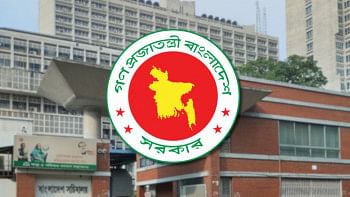Not lost in translation

A collection of poems written by senior and eminent as well as prospective new poets, the book accommodates over 25 works that reflect the moods of Bengali minds -- relations, love, nature, humane crisis and the Liberation War. Interpreted by Khurshida Haq, a Chittagong University graduate in Bangla literature, the book also carries the Bangla versions of the poems. Haq has come up with the poems of Kazi Nazrul Islam, Jibanananda Das, Shamsur Rahman, Nirmalendu Goon, Mahadev Saha, Helal Hafiz, Al Mahmud, Shaheed Quadri, Abul Momen, Abdul Hai Sikder, Syed Shamsul Haq and Abu Karim. Side by side, a few works by younger and not so young poets like Shameem Azad, Begum Jahanara Arzoo, Jarina Akhtar, Humayun Choudhury, Quazi Mahmudur Rahman and Taslima Nasrin have found space.
Most of the works cited in the book were published in different newspapers and magazines. With the intention of introducing Bangladesh's literature to the outside world better, the interpreter, also a former TV journalist, thinks the book, though a meagre initiative, may serve the purpose. She urges all to interpret more Bangla poems to this effect, mentioning that even the works of our national poet Kazi Nazrul Islam have not been published in their full version.
Haq believes that only the interpretation of poet Nazrul's Bidrohi (Rebel) and some of his famous poems on discrimination and the class system could be disseminated around the globe. This book carries the rebel poet's Shikal Porar Gaan (Song Of The Chained) which the national poet of Bangladesh created as an inspiration to those oppressed and subjugated. Nishiddho Sompadokiyo (Banned Editorial) by Helal Fafiz gives a similar impression. It deliberately inspires the young to speak up and protest against the odds, or, to be more precise, injustice. The first line states: This is the best time to join the procession for him who is young.
The poet of nature and love, Jibanananda Das, in his historic poem Abar Asibo Fiire (I Will Return Again) depicts why he is a patriot and why he wants to return to his homeland again and again. His pen has elaborated the splendid scenario of rural Bangladesh --- with its people, nature and river Dhanshiri serving as the focal point. Mahadev Saha's Ami Ekhon Tai (So Am I) portrays his emotional craving for nature --- seems to be free of vengeance.
Home by Abu Karim illustrates his desire to stay with his lover at a house close to nature; it could be a farm house in Siberia or Kazakhstan or inside a rubber or coffee garden in South America.
Shaheed Quadri in his Tomake Obhibadan, Priyotoma (Salutation To You, My Beloved) presents his dearly loved one with tough and even impossible things in a way that they lose their cruel character and get to be devoted to her. On the other hand, in the poems of Taslima Nasrin -- Sanad Potra (Certificate) and Sostar Jinish (Cheap Things) -- she portrays the state of women in Bangladesh and expresses her frustrations over their submissive mindset and reluctance towards establishing personality and empowering themselves the society.
Shamsur Rahman's Tomake Paoar Jonyo He Swadhinata (To Achieve You, Oh Freedom) narrates the struggle of the Bengali people in achieving the nation's independence in 1971 in a bid to live with honour within their own traditions and culture.

 For all latest news, follow The Daily Star's Google News channel.
For all latest news, follow The Daily Star's Google News channel. 



Comments